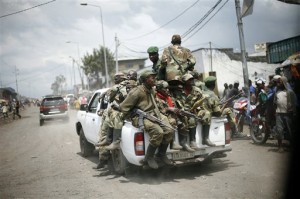Congo warlord says M23 will not back down from UN brigade
* Makenga says M23 will not take Goma, but will not retreat
* Warlord says Kampala talks only way to bring peace to Congo
* M23 will respond if attacked by new U.N. brigade
By Jonny Hogg
MUTAHO, Democratic Republic of Congo, May 27 (Reuters) – E astern Congo’s most powerful warlord stands on a hillside, surrounded by heavily armed fighters, and gazes down on the sprawling lakeside city of Goma spread invitingly below him in the distance.
Exactly what General Sultani Makenga is contemplating for his M23 rebels is a matter of some urgency, both for a government that has struggled to contain the revolt and for a new U.N. force tasked with disarming Congo’s insurgent groups.
Six months ago, Makenga’s fighters routed the ill-disciplined army and swept past U.N. peacekeepers to briefly seize the city of one million, provoking international outcry.
After months of calm, fresh fighting last week raised fears Makenga’s M23 fighters might once again have their sights set on Goma, on the shores of Lake Kivu, ahead of the deployment of the U.N. Intervention Brigade made up of 3,000 African troops.
“We’re not going to take Goma but we’re not going to give up our positions here,” Makenga says of the strategic village of Mutaho, from where refugee camps and army positions are clearly visible in the sun.
Dressed in combat fatigues and wielding a traditional cattle-herder’s stick, Makenga says the only hope of an end to the region’s troubles is to revive stalled peace talks between the government and M23 in neighbouring Uganda.
“The government can’t beat us. They have no choice but to negotiate,” says the lean, 39-year-old veteran of several revolts in mineral-rich eastern Congo. “We’re waiting for the negotiations in Kampala.”
M23 launched its rebellion in Congo’s beautiful but war-torn eastern borderlands more than a year ago. Hundreds of former rebels who had been integrated into the army – veterans, like Makenga, of a previous Tutsi uprising – abandoned their posts saying the government had failed to honour a 2009 peace deal.
Their discipline and military prowess won them large swathes of territory, forcing Kinshasa to the negotiating table.
But the fall of Goma prompted the international community into action. A February deal signed by 11 neighbouring countries sanctioned the deployment of the U.N. force with a mandate to neutralise armed groups like M23 in the eastern border region.
M23 WILL DEFEND ITSELF
As an incentive to peace, the World Bank last week announced $1 billion in development funding provided countries honour February’s agreement not to support rebels in Congo.
U.N. experts have accused Rwanda of sending troops and weapons to M23, which Kigali strongly denies.
Analysts say the latest fighting may have been prompted by the Brigade’s imminent arrival, as M23 jostles to improve its military position before any potential operations against them.
But Makenga insists the government attacked first.
He seems untroubled by the prospect of facing foreign troops if they bring the fight to the rebels. The 3,000-strong Brigade is to be made up of South Africans, Tanzanians and Malawians.
“We can’t attack the U.N. peacekeepers but if they attack us, what choice will we have? We’ll have to defend ourselves.”
The rebels have been weakened after months of infighting between rival factions and a steady stream of defections by those tired of the endless cycle of violence which characterizes eastern Congo’s jungle war.
But morale appears high amongst the remaining fighters, who tote heavy machine guns and rocket launchers as they swig from bottles of juice.
At least 22 people have been killed since fighting resumed a week ago, including three civilians who died when shells landed on aid camps and residential areas in Goma’s outskirts.
No one has publicly admitted hitting civilian targets but NGO workers say it is clear that M23 was responsible. Makenga warned that further collateral damage may be inevitable if the government launched further attacks.
Even here, in M23’s advance headquarters, evidence of the fighting is clear, with houses flattened by government shells.
Makenga, brandishing his walking stick more as a prop than a support, denies reports he was injured in the bombardment.
“They say that I am between life and death. But they’ve killed me many times and I’m still alive,” he says with a smile.
Source: Reuters


0 comments
Kick things off by filling out the form below.
Leave a Comment